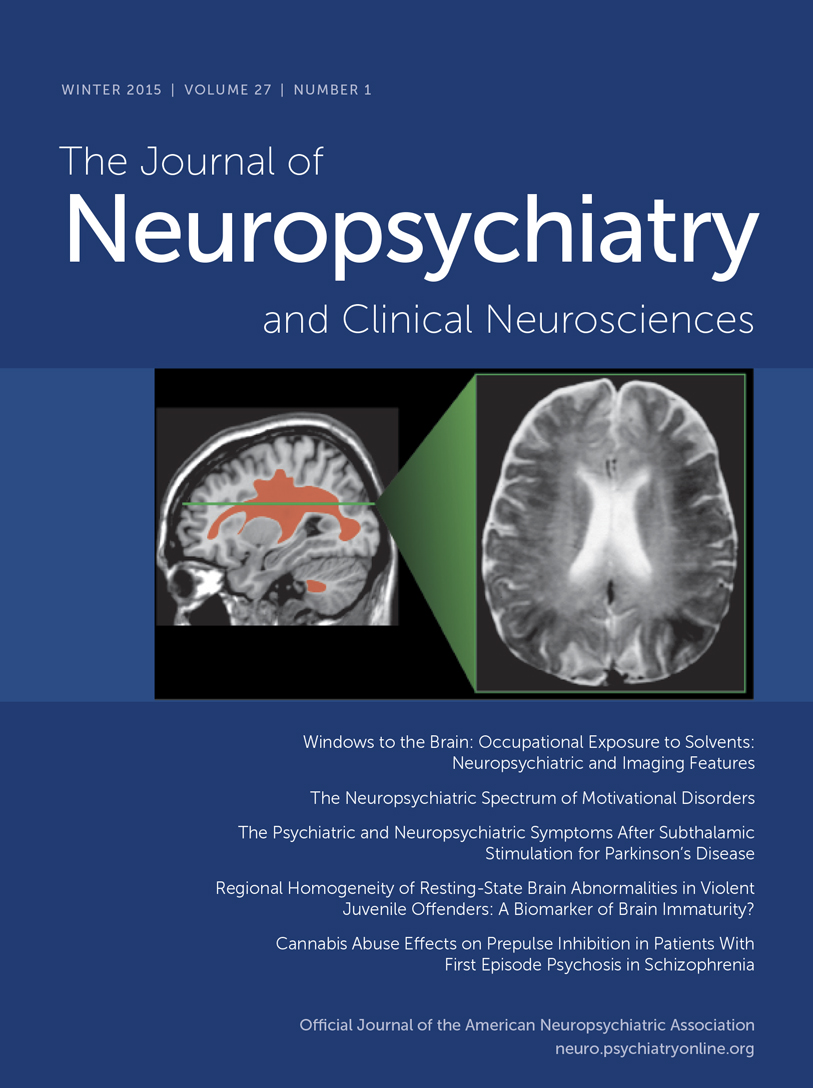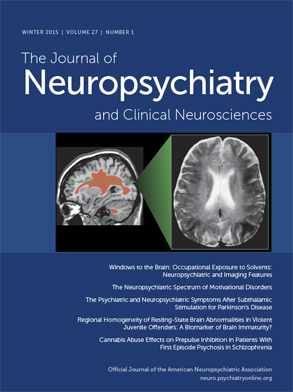To the Editor: A 58-year-old married woman with history of Parkinson’s disease of a 10-year duration marked by right upper extremity rigidity and gait disturbance, but without rest tremor who over the course of her illness, had been treated with amantadine and later pramipexole. She had been stable motorically, cognitively, and psychiatrically until 2 years prior to evaluation, when she had to leave her job as a health care worker on disability. There was no prior psychiatric history, but she became depressed as a result of the job loss and subsequently developed visual hallucinations (a clown figure and the painting “The Scream” by Eduard Munch). More significantly, she developed a delusion that her husband was having an extramarital affair; the patient felt that the mistress came and went via different entrances to their home and was actually in bed with her and her husband, although the patient only sensed her but never actually saw her. She was vigilant about the husband’s whereabouts, and even when he was at work, she was convinced he was with the mistress. The treating neurologist tapered and discontinued pramipexole, and carbidopa/levodopa was substituted as treatment for Parkinson’s disease. Trials of vilazadone and venlafaxine for mood were unsuccessful, and ultimately quetiapine was prescribed for psychosis, but concerns about weight gain prevented further titration of psychotropic medications.
Significant findings on the neuropsychiatric examination included persistent delusion about her husband’s infidelity, decreased motivation, sadness about changes in her lifestyle, stooped posture, increased tone of the right upper extremity, and decreased right arm swing. Cognitively, there was poor recall of a short story, impaired copying (pentagons, cube), and frontal lobe deficits (Luria sequence and poor spacing on clock drawing). Increases in the dose of quetiapine up to 100 mg were without benefit; the patient then developed weight loss, anhedonia, and sleep issues, specifically moving in bed and screaming out at night, suggesting REM behavior disorder. The patient refused polysomnography, but empiric treatment with low-dose clonazepam was of benefit.
At that point, it had been about 1 year without improvement, so ECT was suggested to address depression with psychotic features. After four ECT treatments, her mood and delusion improved, but by the eight treatment, the patient evidenced confusion in temporal and spatial orientation, poor concentration, and worsening short-term recall. ECT was discontinued due to post-ECT delirium. The patient was then started on a low-dose rivastigmine patch (ACHE-I) with notable improvement in concentration, orientation, and goal-oriented thought processes, but her short-term recall was still impaired. Most significantly, her delusion decreased in intensity and frequency.
This case demonstrates an example of Othello syndrome or delusional jealousy, which has been reported in patients with Parkinson’s disease treated with dopamine agonists.
1 Often the reduction of the dopamine agonist or treatment with a second-generation antipsychotic (quetiapine) results in improvement,
2 but this patient did not benefit. Additionally, this patient developed post-ECT delirium, which has been reported in ECT-treated patients with Parkinson’s disease with depression
3; this patient, who had mood and psychotic symptoms, initially improved with ECT, but her cognitive symptoms may have contributed to the subsequent development of delirium. When treated with the ACHE-I, it had the dual benefit of mitigating both the delirium
4 and the delusion. In the future, it may be important to consider treating patients with Othello syndrome with ACHE-Is as a first-line treatment approach.

